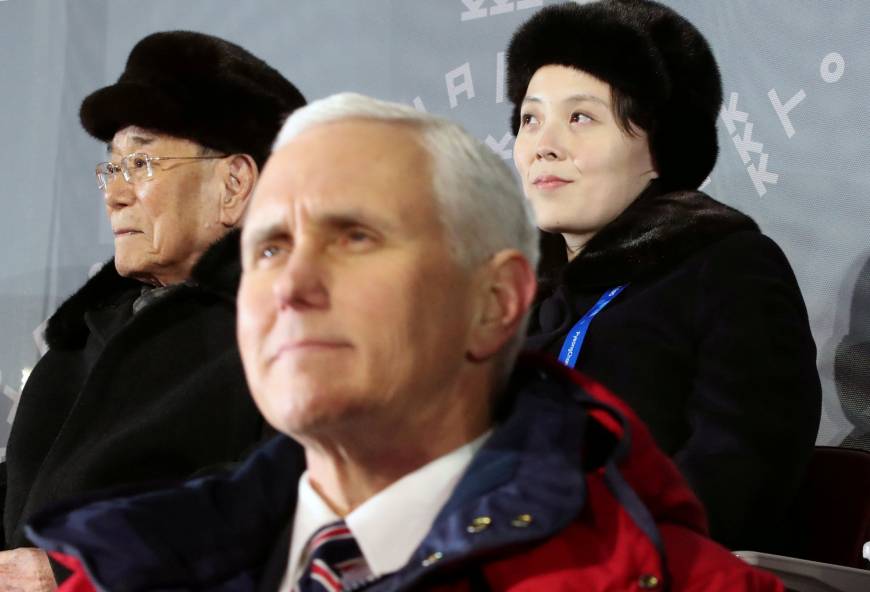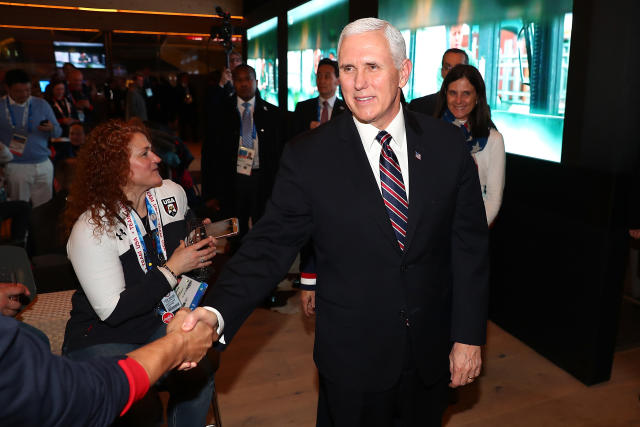Where is the Chinese delegate to support reconciliation in Korea? There is a gorilla in the room hell bent on keeping tensions high. Give peace a chance.

U.S. Vice President Mike Pence attends the Winter Olympics opening ceremony in Pyeongchang, South Korea, as North Korea's nominal head of state, Kim Yong Nam, and North Korean leader Kim Jong Un's younger sister, Kim Yo Jong, sit behind him Friday. | REUTERS
/ |
Pence’s bid to isolate North Korea at Olympics falls flat
AP Feb 10, 2018
PYEONGCHANG – For all of Vice President Mike Pence’s efforts to keep North Korea from stealing the show at the Winter Olympics, the images of the two Koreas marching together — and their officials shaking hands — at a time of heightened tensions on the peninsula proved impossible to counteract.
Pence spent the days leading up to Friday’s opening ceremonies warning that the North was trying to “hijack the message and imagery of the Olympic Games” with its “propaganda.”
But the North was still welcomed with open arms to what South Korean President Moon Jae-in called “Olympic games of peace” and the U.S. appeared to be the one left out in the cold.
Pence sat stone-faced in his seat as Moon and North Koreans officials stood together with much of the stadium to applaud their joint team of athletes. White House officials stressed that Pence had applauded only for the American team, but Asia experts said the vice president’s refusal to stand could be seen as disrespectful to the hosts.
U.S. officials have been urging South Korea to be cautious in its rapprochement with the North — a point Pence drilled home in private meetings with Moon on Thursday.
But North Korea’s terrible record on human rights and the growing threat from its nuclear weapons program appeared out of mind as Moon warmly greeted Kim Yo Jong, the sister of dictator Kim Jong Un, and Kim Yong Nam, the country’s 90-year-old nominal head of state.
Even Japanese Prime Minister Shinzo Abe, who has shared the American skepticism of warming inter-Korean relations, greeted Kim Yong Nam.
At an earlier VIP reception for delegation leaders, Pence arrived late and stayed for just 5 minutes — and did not interact with the delegation from the North.
“The Koreans will think it’s a mood kill,” said Frank Jannuzi, an expert on East Asia at the Mansfield Foundation in Washington. He criticized the Trump administration for straining too hard to signal disgust of Kim Jong Un’s government.
“The grievances that the world has about North Korea are very legitimate. But the Olympic moment that President Moon is trying to generate here is not a time to nurse those grievances,” Jannuzi said. “It’s a time to focus on messages of reconciliation and peace.”
As it turned out, with the two Koreas celebrating a moment of unity, the United States was left outmaneuvered by an adversary and out of step with an ally.
Past administrations have been wary of efforts by Pyongyang to drive a wedge between Washington and Seoul, but still generally supportive of efforts to calm tensions at the heavily militarized border.
On Saturday, Kim Yo Jong and other North Korean delegates arrived at Seoul’s presidential palace for a lunch meeting with Moon. Rumors were swirling that she could be carrying an offer for Moon to travel to North Korea. The last inter-Korean summit was in 2007.
That may turn out to be errant speculation, but the U.S. doesn’t appear to share global relief that there’s a glimmer of hope for diplomacy after a year of escalating tensions and fears of nuclear war, fueled by insults slung between President Donald Trump and Kim Jong Un.
Although South Korea has been a trenchant supporter of Trump’s campaign of “maximum pressure” against North Korea, Moon has been keen to use the Olympics to pry open the door to better relations with its adversary. North Korea has jumped at the opportunity.
The downside for Washington is that it could expose growing differences with Seoul on the best way to deal with North Korea and achieve the ultimate goal of denuclearization.
American officials attempted to paint a rosier picture of Friday’s ceremony as showing solidarity among allies. They stressed the North Koreans in the VIP box had watched Pence, Moon and Abe hold a running discussion in the front row for the more than two-hour ceremonies.
The officials, who spoke on condition because they were not authorized to discuss the U.S. approach publicly, also denied that Pence had been blindsided by the seating arrangement — with the North Koreans in the row behind him, allowing Kim Yo Jong to be easily pictured in profile next to the vice president.
Although some White House aides were leery that the arrangement could produce less-than-ideal optics for Pence, there was no concerted effort to lobby their Korean counterparts for a change, in part out of fear of upsetting the Olympic hosts, said one administration official.
“It’s not a complete disaster,” said James Schoff, former senior Pentagon adviser for East Asia policy. He supported Pence’s moves to meet with North Korean defectors, paying respects at a memorial to 46 South Korean sailors killed in a 2010 torpedo attack blamed on the North. Pence also invited as his Olympics guest the father of U.S. college student Otto Warmbier, who died after he was imprisoned by North Korea for stealing a propaganda poster.
But Schoff said that by pouring cold water on hopes for better inter-Korean relations, Pence’s stance could be viewed as critical of Moon’s outreach to North Korea.
“The fact that’s become the narrative is due in part to things that he’s said and his body language,” Schoff said.
While Moon did not hesitate to shake hands and smile with his North Korean visitors, Pence didn’t appear to even look in the direction of the North Korean delegation during the Friday event.

U.S. Vice President Mike Pence attends the Winter Olympics opening ceremony in Pyeongchang, South Korea, as North Korea's nominal head of state, Kim Yong Nam, and North Korean leader Kim Jong Un's younger sister, Kim Yo Jong, sit behind him Friday. | REUTERS
/ |
Pence’s bid to isolate North Korea at Olympics falls flat
AP Feb 10, 2018
PYEONGCHANG – For all of Vice President Mike Pence’s efforts to keep North Korea from stealing the show at the Winter Olympics, the images of the two Koreas marching together — and their officials shaking hands — at a time of heightened tensions on the peninsula proved impossible to counteract.
Pence spent the days leading up to Friday’s opening ceremonies warning that the North was trying to “hijack the message and imagery of the Olympic Games” with its “propaganda.”
But the North was still welcomed with open arms to what South Korean President Moon Jae-in called “Olympic games of peace” and the U.S. appeared to be the one left out in the cold.
Pence sat stone-faced in his seat as Moon and North Koreans officials stood together with much of the stadium to applaud their joint team of athletes. White House officials stressed that Pence had applauded only for the American team, but Asia experts said the vice president’s refusal to stand could be seen as disrespectful to the hosts.
U.S. officials have been urging South Korea to be cautious in its rapprochement with the North — a point Pence drilled home in private meetings with Moon on Thursday.
But North Korea’s terrible record on human rights and the growing threat from its nuclear weapons program appeared out of mind as Moon warmly greeted Kim Yo Jong, the sister of dictator Kim Jong Un, and Kim Yong Nam, the country’s 90-year-old nominal head of state.
Even Japanese Prime Minister Shinzo Abe, who has shared the American skepticism of warming inter-Korean relations, greeted Kim Yong Nam.
At an earlier VIP reception for delegation leaders, Pence arrived late and stayed for just 5 minutes — and did not interact with the delegation from the North.
“The Koreans will think it’s a mood kill,” said Frank Jannuzi, an expert on East Asia at the Mansfield Foundation in Washington. He criticized the Trump administration for straining too hard to signal disgust of Kim Jong Un’s government.
“The grievances that the world has about North Korea are very legitimate. But the Olympic moment that President Moon is trying to generate here is not a time to nurse those grievances,” Jannuzi said. “It’s a time to focus on messages of reconciliation and peace.”
As it turned out, with the two Koreas celebrating a moment of unity, the United States was left outmaneuvered by an adversary and out of step with an ally.
Past administrations have been wary of efforts by Pyongyang to drive a wedge between Washington and Seoul, but still generally supportive of efforts to calm tensions at the heavily militarized border.
On Saturday, Kim Yo Jong and other North Korean delegates arrived at Seoul’s presidential palace for a lunch meeting with Moon. Rumors were swirling that she could be carrying an offer for Moon to travel to North Korea. The last inter-Korean summit was in 2007.
That may turn out to be errant speculation, but the U.S. doesn’t appear to share global relief that there’s a glimmer of hope for diplomacy after a year of escalating tensions and fears of nuclear war, fueled by insults slung between President Donald Trump and Kim Jong Un.
Although South Korea has been a trenchant supporter of Trump’s campaign of “maximum pressure” against North Korea, Moon has been keen to use the Olympics to pry open the door to better relations with its adversary. North Korea has jumped at the opportunity.
The downside for Washington is that it could expose growing differences with Seoul on the best way to deal with North Korea and achieve the ultimate goal of denuclearization.
American officials attempted to paint a rosier picture of Friday’s ceremony as showing solidarity among allies. They stressed the North Koreans in the VIP box had watched Pence, Moon and Abe hold a running discussion in the front row for the more than two-hour ceremonies.
The officials, who spoke on condition because they were not authorized to discuss the U.S. approach publicly, also denied that Pence had been blindsided by the seating arrangement — with the North Koreans in the row behind him, allowing Kim Yo Jong to be easily pictured in profile next to the vice president.
Although some White House aides were leery that the arrangement could produce less-than-ideal optics for Pence, there was no concerted effort to lobby their Korean counterparts for a change, in part out of fear of upsetting the Olympic hosts, said one administration official.
“It’s not a complete disaster,” said James Schoff, former senior Pentagon adviser for East Asia policy. He supported Pence’s moves to meet with North Korean defectors, paying respects at a memorial to 46 South Korean sailors killed in a 2010 torpedo attack blamed on the North. Pence also invited as his Olympics guest the father of U.S. college student Otto Warmbier, who died after he was imprisoned by North Korea for stealing a propaganda poster.
But Schoff said that by pouring cold water on hopes for better inter-Korean relations, Pence’s stance could be viewed as critical of Moon’s outreach to North Korea.
“The fact that’s become the narrative is due in part to things that he’s said and his body language,” Schoff said.
While Moon did not hesitate to shake hands and smile with his North Korean visitors, Pence didn’t appear to even look in the direction of the North Korean delegation during the Friday event.


